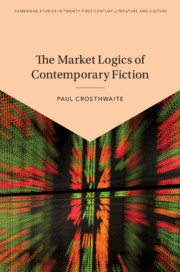Book contents
- The Market Logics of Contemporary Fiction
- Cambridge Studies in Twenty-First-Century Literature and Culture
- The Market Logics of Contemporary Fiction
- Copyright page
- Dedication
- Contents
- Acknowledgements
- Introduction
- Part I The Emergence of Market Metafiction
- Part II The Phantasmagorias of Contemporary Finance
- Chapter 2 Trading in the As If
- Chapter 3 “The Occult Logic of ‘Market Forces’”
- Part III The Market Knows
- Part IV The Moment of Market Metafiction
- Notes
- Index
Chapter 2 - Trading in the As If
Fiduciary Exchangeability and Supernatural Financial Fiction
from Part II - The Phantasmagorias of Contemporary Finance
Published online by Cambridge University Press: 04 July 2019
- The Market Logics of Contemporary Fiction
- Cambridge Studies in Twenty-First-Century Literature and Culture
- The Market Logics of Contemporary Fiction
- Copyright page
- Dedication
- Contents
- Acknowledgements
- Introduction
- Part I The Emergence of Market Metafiction
- Part II The Phantasmagorias of Contemporary Finance
- Chapter 2 Trading in the As If
- Chapter 3 “The Occult Logic of ‘Market Forces’”
- Part III The Market Knows
- Part IV The Moment of Market Metafiction
- Notes
- Index
Summary
This chapter argues that we might better understand postmodernism’s ambivalent appropriation of genre models by theorizing it in terms of a logic of quasi- or “as if” belief that cuts across structures of financial and literary market exchange. Taking recent work in economic sociology and the “New Economic Criticism,” as jumping-off points it shows how a deep-rooted kinship between fiction and finance as forms of writing that mediate value in the modern credit economy (in Mary Poovey’s terms) are becoming newly visible today. The shared condition of fictional texts’ and financial and monetary instruments’ successful market circulation is their solicitation of tacit faith or trust in imaginary things. A desire both to exploit and to subvert this condition of “fiduciary exchangeability” shapes the experiments in supernatural narrative form offered by Bret Easton Ellis’s American Psycho (1991) and Lunar Park (2005), Anne Billson’s Suckers (1993), Stephen Marche’s The Hunger of the Wolf (2015), and Jonathan Coe’s The Terrible Privacy of Maxwell Sim (2010). In the work of these writers we see many of the crucial elements of market metafiction in action.
Keywords
- Type
- Chapter
- Information
- The Market Logics of Contemporary Fiction , pp. 71 - 91Publisher: Cambridge University PressPrint publication year: 2019

